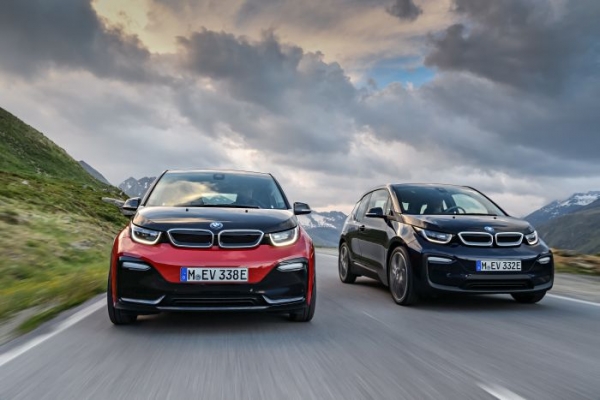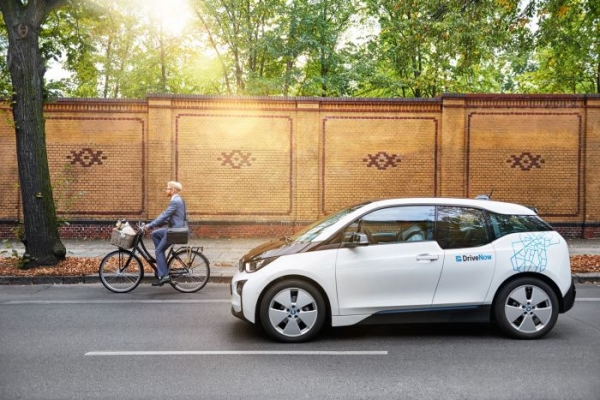
11.7.2019 Munich. The BMW Group moves into Germany with their electrified models in the fast Lane.
In the first six months of the year 2019 could be delivered with more than 10,000 electrified Fahrzeugen1 (fully electric and Plug-in Hybrid vehicles) around 60 per cent more vehicles in comparison to the prior-year period to customers in Germany.
Sebastian Mackensen, head of BMW Germany, said: “the BMW Group the present is already electric. No one is sold in Germany as many electrified vehicles as we are. Our customers can today choose vehicles of all size classes, ranging from the purely electrically powered BMW i3 and the MINI Cooper SE, via a Plug-in Hybrid variants of the BMW 2 series, 3 series and 5 series and the BMW X5, up to the luxurious BMW 7 series. With this diverse offering, we are the clear market leader in Germany with a segment share of 20 per cent2, and to drive forward the Expansion of our electrified product range.“
Content
- BMW i3’s top-selling model of the electrified fleet of the BMW Group in Germany – 25 electrified models in 2023
- Three of the five best-selling Plug-in Hybrid vehicles in Germany by the BMW Group
- Fourth-Generation E-drives with significantly increased ranges
- CO2 emissions & fuel consumption.
BMW i3’s top-selling model of the electrified fleet of the BMW Group in Germany – 25 electrified models in 2023
On the German market the all-electric BMW i3 is the best-selling model of the electrified fleet of the BMW Group. The BMW i3 is built already for the sixth year in a row since the market introduction in 2013, its sales and exceeded the previous year’s sales in the first six months of this year to 85 percent
This year, the all-electric Portfolio, BMW Group expanded with a few days ago presented to the Public electric MINI Cooper SE* and in 2020 with the BMW iX3-extended. In 2021, the BMW iNEXT, which is manufactured in Dingolfing, and BMW i4 as the plant in Munich, the range of purely electrically driven vehicles. Already in 2023, the BMW Group aims to have 25 electrified models in the range. More than half of the 25 models will be fully electric.


The BMW i3 and the BMW i3s. (Photo: BMW AG)
Three of the five best-selling Plug-in Hybrid vehicles in Germany by the BMW Group
The best-selling PHEV model the BMW Group the BMW 225xe Active Tourer, with a sales increase of 55 percent (compared to is. Year-on-year), followed by the BMW 530e*, was able to double its sales compared to the previous year. Along with the MINI Cooper S Countryman ALL4* (+81% yoy. Year-on-year) to prove these three models, three of the five approval of the top places in the Plug-in Hybrid models in Germany. The extensive range of BMW Plug-in Hybrid program will be completed in the next few months, the X3 xDrive30e*.
Fourth-Generation E-drives with significantly increased ranges
The BMW X5 xDrive45e* and the Plug-in Hybrid variant of the new BMW 3 series, the BMW 330e*, start this year with subsequent models. The fourth Generation of the E-drives provides significantly increased range: the BMW X5 xDrive45e achieved in the statutory test cycle, a pure electric range of 86 to 97km, the BMW 330e reaches from 59 to 66 km in electric mode*. With this Plug-In Hybrid models, most of the daily driving can be made electrically, without sacrificing the classic BMW driving pleasure over long distances. With the activation of the electric driving mode users for the reduction of emissions and traffic contribute to noise in the city, and driving into the environmental zones and in many places, Parking privileged.
All electrified models from the BMW Group are E-mark is entitled. The BMW Group is at the top of the BAFA statistics for the award of the eco-bonus.
CO2 emissions & fuel consumption.
BMW i3 (120 Ah): electrical consumption combined: 13,1 kWh/100 km; CO2 emission, combined: 0 g/km
BMW i3s (120 Ah): electrical consumption combined: 14,6-14,0 kWh/100 km; CO2 emission, combined: 0 g/km
BMW 225xe iPerformance Active Tourer: fuel consumption of 2.1-1.9 l/100 km combined:; combines power consumption: 14,2-13,5 kWh/100 km; CO2 emissions combined: 47-42 g/km
BMW 330e sedan: combined fuel consumption: 1,9-1.6 l/100 km; power consumption combined: 15.4 to a 14.8 kWh/100 km; CO2 emissions combined: 43-37 g/km
BMW 530e iPerformance sedan: combined fuel consumption: 1,8-1.6 l/100 km; power consumption combined: 14,5-13.6 kWh/100 km, CO2-emissions combined: 41-36 g/km
BMW 745e sedan: combined fuel consumption: 2,2-2.1 l/100 km; power consumption combined: 15,5-15.1 kWh/100 km, CO2-emissions combined: 51-48 g/km
BMW X3 xDrive30e: combined fuel consumption: 2.4 l/100 km; power consumption combined: from 22,7 kWh/100 km; combined CO2 emissions: 56 g/km
Expected to be available from 12/2019. The details are estimated and not officially confirmed values. The estimated consumption values were determined in accordance with the prescribed measuring process VO (EU) 715/2007 in the currently applicable version.
BMW X5 xDrive45e: combined fuel consumption: 2,0-1,7 l/100 km; power consumption combined: 23,5-by 20.3 kWh/100 km; CO2 emissions combined: 47-39 g/km (provisional figures)
MINI Cooper S Countryman ALL4: combined fuel consumption: 2,1-1,9 l/100 km; power consumption combined: 13,6-13,5 kWh/100 km, CO2-emissions combined: 47-43 g/km
MINI Cooper SE: fuel consumption combined: 0.0 l/100 km; power consumption combined: a 15.0-13.2 kWh/100 km, CO2-emissions combined: 0 g/km


DriveNow – BMW i3 (94 Ah): electrical consumption combined: 13,6-13,1 kWh/100 km; CO2 emission, combined: 0 g/km.